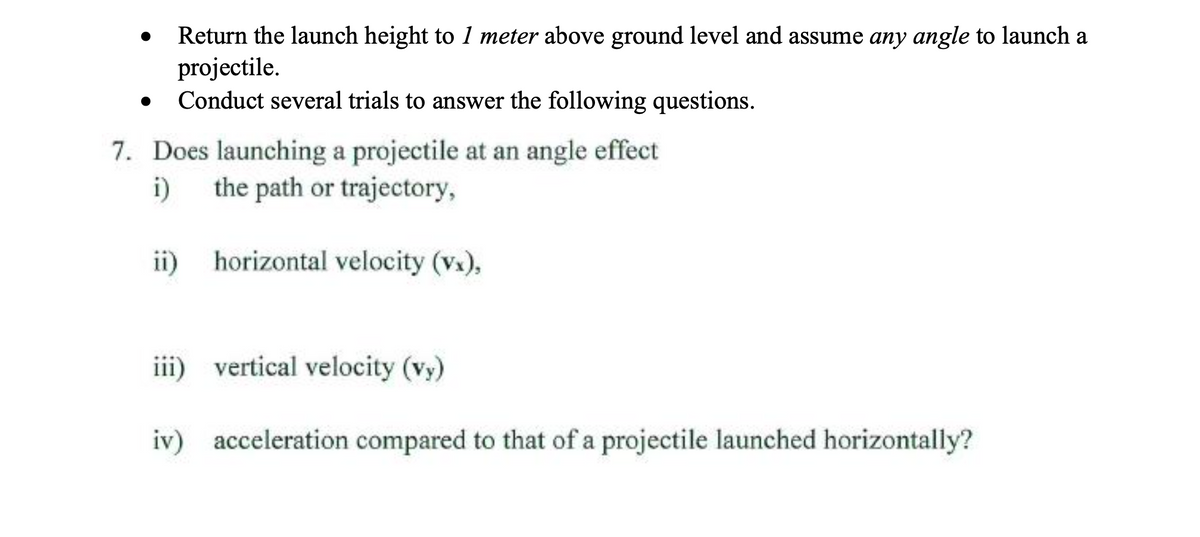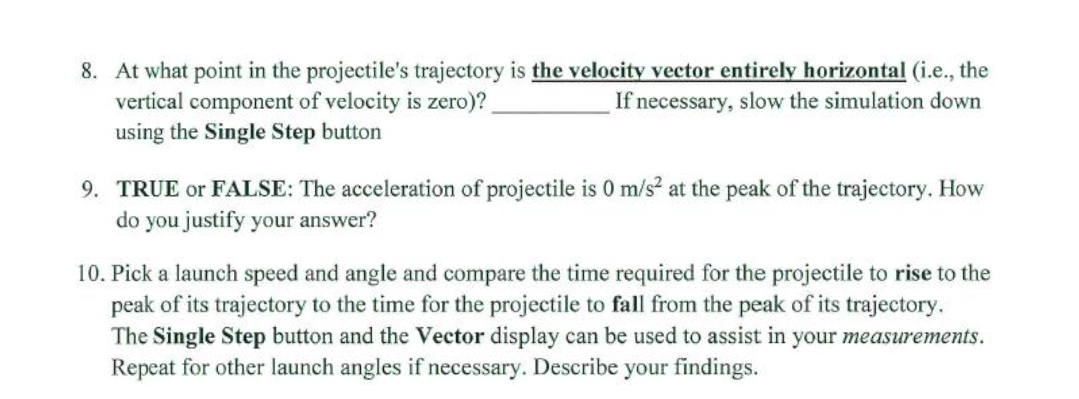7. Does launching a projectile at an angle effect i) the path or trajectory, ii) horizontal velocity (vx), iii) vertical velocity (vy) iv) acceleration compared to that of a projectile launched horizontally?
7. Does launching a projectile at an angle effect i) the path or trajectory, ii) horizontal velocity (vx), iii) vertical velocity (vy) iv) acceleration compared to that of a projectile launched horizontally?
University Physics Volume 1
18th Edition
ISBN:9781938168277
Author:William Moebs, Samuel J. Ling, Jeff Sanny
Publisher:William Moebs, Samuel J. Ling, Jeff Sanny
Chapter2: Vectors
Section: Chapter Questions
Problem 61P: In the control tower at a regional airport, an air traffic controller monitors two aircraft as their...
Related questions
Concept explainers
Topic Video
Question
100%

Transcribed Image Text:Return the launch height to 1 meter above ground level and assume any angle to launch a
projectile.
Conduct several trials to answer the following questions.
7. Does launching a projectile at an angle effect
i)
the path or trajectory,
ii)
horizontal velocity (vx),
iii) vertical velocity (vy)
iv) acceleration compared to that of a projectile launched horizontally?

Transcribed Image Text:8. At what point in the projectile's trajectory is the velocity vector entirely horizontal (i.e., the
vertical component of velocity is zero)?
using the Single Step button
If necessary, slow the simulation down
9. TRUE or FALSE: The acceleration of projectile is 0 m/s at the peak of the trajectory. How
do you justify your answer?
10. Pick a launch speed and angle and compare the time required for the projectile to rise to the
peak of its trajectory to the time for the projectile to fall from the peak of its trajectory.
The Single Step button and the Vector display can be used to assist in your measurements.
Repeat for other launch angles if necessary. Describe your findings.
Expert Solution
Step 1
7.
1. Trajectory equation:
It depends on if angle is small, path is less steeper.
Yes angle affects path or trajectory of projectile.
2. Horizontal velocity:
It also depends on angle so it is affected by angle.
But horizontal velocity is constant as gravity only affects vertical velocity.
Trending now
This is a popular solution!
Step by step
Solved in 2 steps

Knowledge Booster
Learn more about
Need a deep-dive on the concept behind this application? Look no further. Learn more about this topic, physics and related others by exploring similar questions and additional content below.Recommended textbooks for you

University Physics Volume 1
Physics
ISBN:
9781938168277
Author:
William Moebs, Samuel J. Ling, Jeff Sanny
Publisher:
OpenStax - Rice University

Physics for Scientists and Engineers: Foundations…
Physics
ISBN:
9781133939146
Author:
Katz, Debora M.
Publisher:
Cengage Learning

Glencoe Physics: Principles and Problems, Student…
Physics
ISBN:
9780078807213
Author:
Paul W. Zitzewitz
Publisher:
Glencoe/McGraw-Hill

University Physics Volume 1
Physics
ISBN:
9781938168277
Author:
William Moebs, Samuel J. Ling, Jeff Sanny
Publisher:
OpenStax - Rice University

Physics for Scientists and Engineers: Foundations…
Physics
ISBN:
9781133939146
Author:
Katz, Debora M.
Publisher:
Cengage Learning

Glencoe Physics: Principles and Problems, Student…
Physics
ISBN:
9780078807213
Author:
Paul W. Zitzewitz
Publisher:
Glencoe/McGraw-Hill

College Physics
Physics
ISBN:
9781938168000
Author:
Paul Peter Urone, Roger Hinrichs
Publisher:
OpenStax College